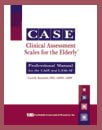
Clinical Assessment Scales for the Elderly case
For: Comprehensive measure of acute psychopathology in the elderly ages 55-90 years
Reading Level: Adult - Elder Adult
Format: Paper-and-Pencil
Length: 20-40 minutes
Scoring: Hand Scored
Printed Kits
Click to browse products
CASE Introductory Kit
Author
Cecil R. Reynolds, PhD, Erin D. Bigler, PhD
Description
The CASE is designed to assist the clinician in the diagnosis of DSM-IV Axis I clinical disorders in individuals from ages 55 to 90 years. The CASE consists of a self-rating form (Form S) and an other-rating form (Form R) that may be completed by a knowledgeable caregiver (e.g., a spouse, child, home health care worker, sibling). Form R is especially useful to verify the information provided by the patient, or when the patient is unable to complete the assessment due to physical or cognitive difficulties.
Developed specifically to assess for the most prominent DSM-IV disorders among the elderly.
Normed on a U.S. census-matched sample of 2,000 adults, ages 55-90 years.
Consists of 10 clinical scales: Anxiety (ANX), Cognitive Competence (COG), Depression (DEP), Fear of Aging (FOA), Obsessive-Compulsive (OCD), Paranoia (PAR), Psychoticism (PSY), Somatization (SOM), Mania (MAN), and Substance Abuse (SUB).
Includes a valuable Fear of Aging scale that assesses an individual’s level of apprehension about the aging process.
CASE items are free of gender or ethnic bias.
Contains three validity scales especially useful to identify feigning and for forensic assessments.
Administration and Scoring
Patients and knowledgeable caregivers may complete the CASE in 40 minutes or less. Scoring and profiling are easy. CASE raw scores are converted to T scores using the age-appropriate normative tables. The T scores are then plotted on the CASE Profile Form to provide a graphic overview of the patient’s clinical status or a comparison of multiple profiles when available.
Reliability and Validity
Total normative group of 2,000 adults, matched to U.S. census data for gender, geographic region, educational level, and ethnicity (normative data are based on 1,000 each of Form S and Form R).
Construct validity of CASE Form S is demonstrated by correlations with the MMPI-2, Beck Depression Inventory (BDI), Beck Hopelessness Scale (BHS), and both the State and Trait scales of the State-Trait Anxiety Inventory (STAI). A group of dementia patients were evaluated using the CASE Form R and the Cognitive Behaviour Rating Scales (CBRS).
Studies of gender and ethnic bias indicate no clinically significant differences as a function of gender or of ethnicity among Caucasians, African Americans, and Hispanics.
Validity scales for Forms S and R include measures of positive and negative distortion and dissimulation (L scale), infrequently endorsed items (F scale), and detection of random responding, failure to comprehend the items and lack of cooperation (V scale).
Related Products:
NB: Prices are in Australian dollars inclusive of GST. NZ customers need to log in to view ex-GST prices.



